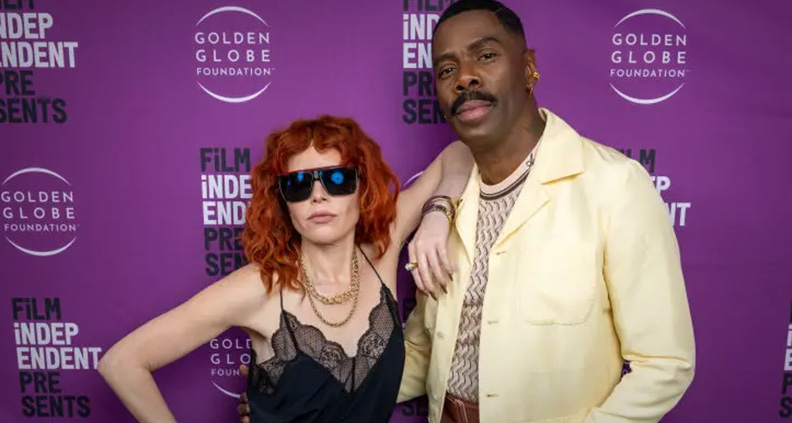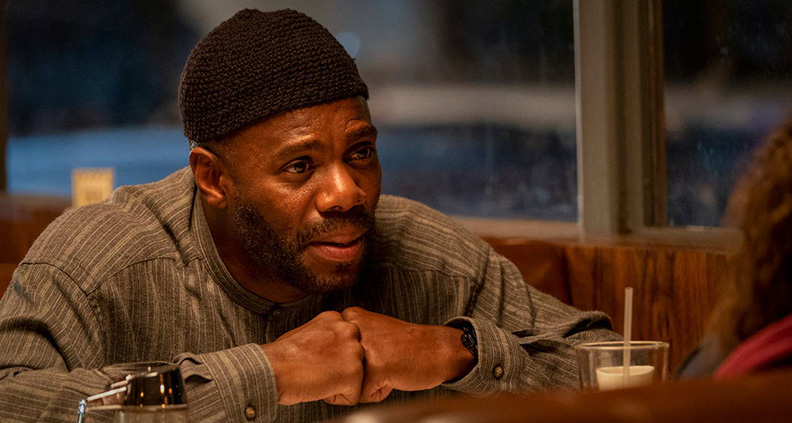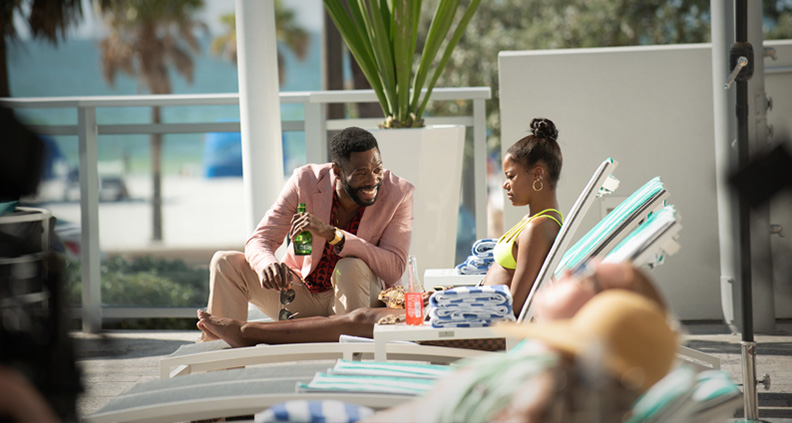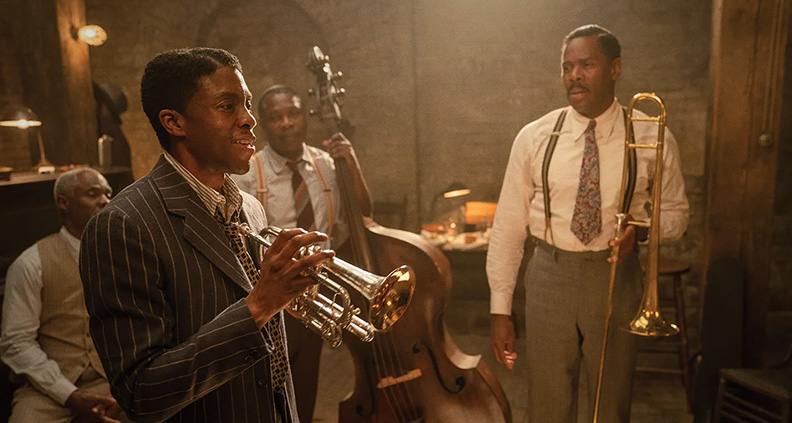Film Independent Presents Recap: An Evening with Colman Domingo
On January 13, just over a week before he received an Academy Award nomination for the Obamas-produced biopic Rustin, Film Independent Presents celebrated the career of esteemed stage and screen powerhouse–not to mention two-time Film Independent Spirit Award nominee!–Colman Domingo. Held at The Hammer Museum’s Billy Wilder Theater in Los Angeles, the in-person conversation was moderated by the iconic Natasha Lyonne, who Domingo lovingly referred to as his “sister” in the entertainment industry.
The evening spotlighted many of the actor’s most notable roles, culminating of course with his turn as Civil Rights leader and March on Washington organizer Bayard Rustin, for which he has earned nominations from the Golden Globes and Critics Choice Awards in addition to the Oscars. Watch the full conversation below:
Film Independent’s Josh Welsh and Alana Waksman–Fi’s President and Nonfiction Programs and Fiscal Sponsorship Coordinator, respectively–began the evening with introductory remarks. Waksman, a friend and former acting student of Domingo, shared some heartfelt words about his mentorship, even shedding a few tears. The audience was then treated to a wonderfully curated six-minute reel of his most well-known screen and stage work. So by the time he and Lyonne were called to the stage, the packed house was eager to welcome them.
Lyonne–in an all-black lace jumpsuit with her vibrant red hair–was her colorful, charismatic self. She made sure to remind everyone in the room that Colman Domingo is most certainly not “some nobody off the turnip truck.” Domingo flashed a bashful smile, though his outfit was anything but: a pastel yellow jacket with burnt orange pants in polished white loafers. Clearly, both were dressed to impress.

Before getting to the first clip, Domingo shared that he was always a shy kid growing up. “People in high school would never have imagined I’d be doing what I’m doing. I wouldn’t imagine what I’d be doing.” But he was a people watcher by nature. When he realized he wanted to uncover who we actually are as humans, his passion for the arts was birthed–to this day, he considers involvement in the arts “an act of service.” Lyonne said he was “truly the living embodiment of the thing,” his work is of service to each individual project and not his own ego. “Which is so crazy, because if anyone deserves to have the ultimate ego it’s Colman Domingo.”
Colman is proud to have been a journeyman, which to him meant that one minute he was on Broadway; the next, a bartender. “I believe you [were a bartender] with the same obsessive dedication to being a channel and a vessel,” Lyonne said. “I was a good bartender!” Domingo agreed, saying he always made it a priority to find fulfillment and joy wherever he is in his career–and by extension, his life. He recalled staying past closing time at the 55 Bar in New York City, where he once worked, writing his first solo theatrical piece through the night right before dawn.
In this way he was “always an artist,” a mindset meant as a means to claim his own agency–especially in the challenging early days of his acting career. This way the artist in him would always be of relevance and not feel like a separate thing. He stressed feeling, learning and evolving. With this in mind, it’s easy to see how he allows himself to sink his teeth into every role he takes on.

Cue the Euphoria clip, in which Ali Muhammed (Domingo) interacts with series protagonist Rue (Zendaya) at an all-night diner. Lyonne expressed how convincing Domingo was as a recovering addict in the role. “And I’m one to know!” she joked. He said it was one of his favorite characters he’s ever played, deeply connecting to Ali’s passion, as well as series creator Sam Levinson’s stylized dialogue.
The actor shared a story from a woman who wrote in after seeing him on Euphoria to talk about her mother–an addict who had recently passed. Because of the addiction, they never had a good relationship. But watching Domingo’s performance inspired her to forgive her late mother.
Like Ali, Domingo urges people to examine culture and society. He believes in actively questioning what it is people do–and why they do it–in all areas of life. He recalled meeting Levinson for the first time at a party, jumping animatedly from one topic to another. Inspired by the conversation and impressed with Domingo’s gravitas and unique perspective on the world, Levinson created the character of Ali just for him.

In the Zola clip, X (Domingo) has an unpleasant interaction with Zola (Spirit Award winner Taylour Paige) by a hotel pool. Lyonne pointed out how unusual the role was for Domingo, as a menacing pimp. Domingo recalled being a little hesitant about the project, wondering how filmmaker Janizca Bravo ever thought to consider him for such a part. But in discussing with Bravo, he said he observed a level of “artistic insanity” in her vision which he found totally fascinating, convincing him to take the role. For the performance, Domingo said he had to create a sympathetic backstory for the character–very important, he stressed, when playing a villain. “They have a point of view,” he said.
In a clip from Ma Rainey’s Black Bottom, Domingo’s working class musician Cutler gets into a boiling argument about faith with the brash Levee Green (Chadwick Boseman), leading to a physical altercation. When the clip ended, Lyonne acknowledged Boseman’s performance and checked in on her friend, who was visibly moved by the clip.
“I’d never seen that film in a theater,” said Domingo. “To see it in this size and to see Chad’s eyes–it is what it is.” As the project was filming, Boseman was already ailing, eventually passing away from cancer in August 2020. Ma Rainey would be the acclaimed actor’s final film, and Domingo shared the first thing he remembered Boseman telling him in rehearsals: “Oh man, I can’t wait to dance with you.”
“There were lots of layers happening in that scene,” explained Domingo. “There was something else at work. He [Boseman] was going through that monologue when he stopped. There was something happening.” When “cut” was finally called, he and Boseman embraced, sobbing. Domingo reflected on that moment and determined that, whether it was him or his character, he needed to be of service to his friend. It was absolutely necessary for him to be the push to Boseman’s pull. “He left such a great legacy in many ways–not only in this work, but what he did in the world.”

Lyonne addressed Domingo’s varied physicality–his shifting body language and facial expressions, role to role. (She also made a point of saying how good he looked in a European bathing suit.) “I try to find the body, the voice, the astrological sign, what I eat, how I eat, how they have sex,” said Colman of building a character, which he then “downloads,” or internalizes, to portray each character as human as possible. The ability to transform into his characters, as he puts it, has been sort of a superpower since the beginning of his career. “People think I just got here like last week,” he said. “But that’s because people couldn’t put a pin on me.”
Lyonne asked about the first time Domingo met Ma Rainey and Rustin director George C. Wolfe. Domingo recounted auditioning for Wolfe about five times before ever getting cast, Wolfe failing to remember a single one. Then, he said, he got an offer for Ma Rainey. “Well, it can’t be the George C. Wolfe, because he doesn’t like my work!” he joked. It was the first time Domingo had worked with the renowned theater legend–a collaboration that has proved very fruitful for each.
“For years people have said to me: When they do a biopic about Bayard Rustin it should be you,” he said. “At 19-years-old, I learned about him in an African American Student Union group and I was fascinated with him. I understood he was marginalized in history books because he was openly gay. He made an impression on me.”
Domingo’s fascination with the Civil Rights figure marked him as a source of inspiration in his own life—on his own journey to success not just career-wise, but more importantly spiritually and morally. Wolfe would get a hold of the script once the Obamas (yes, those Obamas) greenlit it, and producer Bruce Coen would eventually call Domingo with the words: “On behalf of President Barack Obama and Michelle Obama, Higher Ground and George C. Wolfe, we’d be honored if you’d be our Bayard Rustin.”
“Only some people receive good news such as that, the opportunity to embody your hero,” said Domingo, grateful.
In the Rustin clip, Bayard (Domingo) delivers a monologue cautioning the marginalized not to behave as the oppressor, to divide the marginalized. It’s a striking monologue delivered with poise and emotion. Domingo gave the role all he could, showing up to private rehearsals with Wolfe and other costars, down to getting Rustin’s unique accent just right. “The spirit of this man has entered and said: Hey thanks for finding the right guy, because I do have a story to tell,” Lyonne swooned.
Domingo thanked her. “Well on behalf of Rustin’s ghost, you’re welcome,” said Natasha, to audience laughter. Why was now the right time to make a film about Bayard Rustin? Easy, Domingo said, it’s always been the time to make a film about Bayard Rustin–though the film did come out on the 60th anniversary of the March on Washington. “When we can go to art in a safe space like film to interrogate, to question, to wrestle… In a dark space together–in a community–things can actually change.”
Rustin is now streaming on Netflix.
Film Independent promotes unique independent voices by helping filmmakers create and advance new work. If you want to help support us and all that we do to help support visual storytellers worldwide, now’s the time. Not a Member of Film Independent? Become one today.
